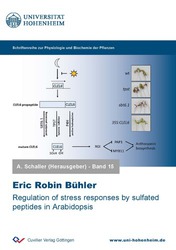| Areas | |
|---|---|
| Serie de libros (97) |
1381
|
| Nachhaltigkeit |
3
|
| Gesundheitswesen |
1
|
| Letra |
2369
|
| Ciencias Naturales |
5408
|
| Matemática | 229 |
| Informática | 319 |
| Física | 980 |
| Química | 1364 |
| Geociencias | 131 |
| Medicina humana | 243 |
| Estomatología | 10 |
| Veterinaria | 108 |
| Farmacia | 147 |
| Biología | 835 |
| Bioquímica, biología molecular, tecnología genética | 121 |
| Biofísica | 25 |
| Nutrición | 45 |
| Agricultura | 1005 |
| Silvicultura | 201 |
| Horticultura | 20 |
| Ecología y conservación de la tierra | 148 |
| Ciencias Ingeniería |
1795
|
| General |
98
|
|
Leitlinien Unfallchirurgie
5. Auflage bestellen |
|
Erweiterte Suche
Regulation of stress responses by sulfated peptides in Arabidopsis (Volumen 15) (Tienda española)
Andreas Schaller (Editor)Eric Robin Bühler (Autor)
Previo
Lectura de prueba, PDF (1,1 MB)
Indice, PDF (130 KB)
Kleine posttranslational modifizierte Peptide nehmen eine bedeutende Rolle in der Pflanzenentwicklung und dem Wachstum ein. Sie werden als inaktive Vorläuferproteine synthetisiert und durch mehrere posttranslationale Modifikationen gereift. Zu diesen Modifikationen zählen die Prolin-Hydroxylierung, Glykosylierung,
Tyrosin-Sulfatierung und proteolytische Prozessierungen. Neueste Erkenntnisse haben auch wichtige Rollen für Peptide in der pflanzlichen Stressantwort aufgedeckt.
Pflanzen sind aufgrund ihrer sessilen Lebensweise abiotischem und biotischem Stress ausgesetzt und müssen die Waage zwischen Stressantwort und Wachstum balancieren um zu überleben.
Due to the phenomenon of climate change and thus altered environmental conditions for plants, the understanding of the plant’s stress responses is moving into the focus of vast scientific studies. These responses are triggered by abiotic
stresses such as salinity, drought, and heat, or biotic stresses, for instance, caused by insects, fungi, or bacteria. The plant stress response involves a delicate balance between growth and stress defense/tolerance, ultimately influencing the plant’s fitness and survival.
| ISBN-13 (Impresion) | 9783736979482 |
| ISBN-13 (E-Book) | 9783736969483 |
| Formato | A5 |
| Idioma | Inglés |
| Numero de paginas | 192 |
| Laminacion de la cubierta | Brillante |
| Edicion | 1. |
| Serie | Schriftenreihe zur Physiologie und Biochemie der Pflanzen |
| Volumen | 15 |
| Lugar de publicacion | Göttingen |
| Lugar de la disertacion | Universität Hohenheim |
| Fecha de publicacion | 30.01.2024 |
| Clasificacion simple | Tesis doctoral |
| Area |
Biología
|
| Palabras claves | abscisic acid, Abszisinsäure, assoziierte Rezeptorkinase 1, associated receptor kinase 1, cauliflower mosaic virus, Blumenkohlmosaikvirus, schädigungsassoziiertes Molekülmuster, damage-associated molecular pattern,Expression, arabidopsis, peptides, seedlings, peptide, anthocyanin, light, growth, plants, results, etiolated, root, mutant, signalling, receptor, biosynthesis, type, control |








